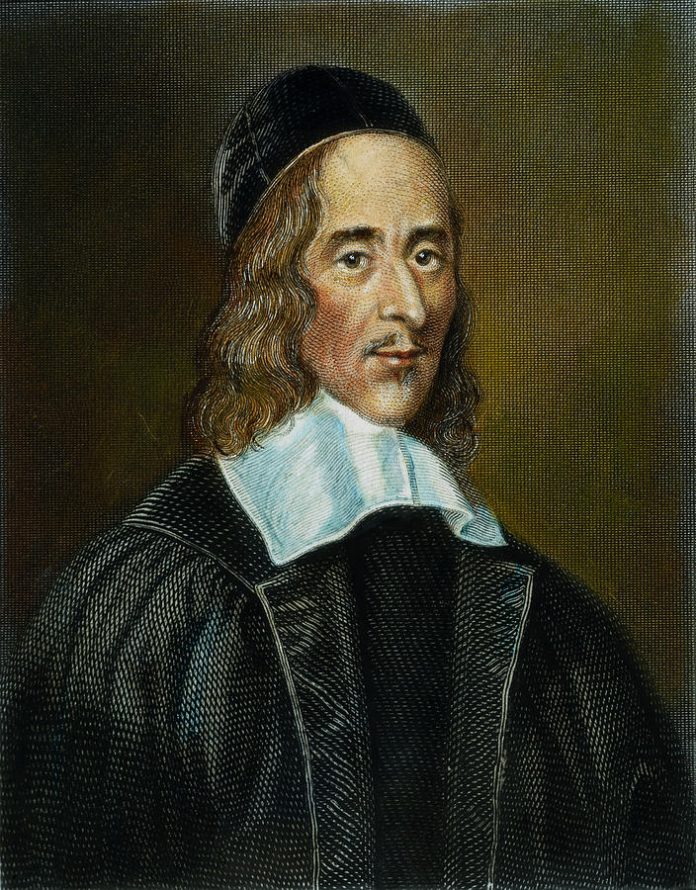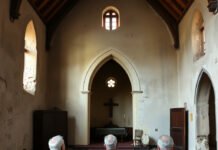Softness, and peace, and joy, and love, and bliss,
Exalted manna, gladness of the best,
Heaven in ordinary, man well drest,
The Milky Way, the bird of Paradise,
Blogging in my retirement, I’ve enrolled in the ranks of the pajama media myself. But from years in Africa, I would agree on the importance of dressing “smart.”
Dennis Lennon continues:
No one gets out of bed well dressed. As my wife explains to me frequently, a smart appearance doesn’t simply arrive with the morning post…. So when George Herbert says that prayer is “man well dressed,” I am inclined to think he means the necessary prayer before prayer, preparation for prayer; the act of praying oneself into prayer. Who of us would question the need for it. Left to ourselves, isn’t it true that most of us are spiritually asleep most of the time?…
Experience and experiment over the years evolves strategies for entering into prayer. Some folk claim their inner world first thing in the day by reading a psalm or meditating on a set daily passage of scripture. Others, I am assured, sing or listen to spirit-warming music, they may contemplate a picture or an icon or a candle flame. We each must find our own way and having done so share our findings with one another….
Although we may come to God “well-dressed” in prayer that of itself can never be grounds of our confidence. Herbert’s apparently quaint and homely metaphor is a ticking time bomb when it sinks into our understanding and explodes its meaning. We dress up, and are met by the God who dresses down: prayer is “heaven in ordinary, man well dressed.” A couple weeks ago I witnessed a nice illustration of what Herbert is saying.
The Queen visited our small town. I have a couple photos of the occasion… In them the people are smiling, the policewoman is smart and watchful; the mayor looks satisfied if slightly burdened, a group of Morris dancers are clearly in top form. But it’s the children I am most intrigued by. I wonder what they made of the occasion? Were they a shade disappointed? I ask this because although the market place was thoroughly well-dressed for the visit, the Queen arrived “in ordinary.” She looked like anyone’s grandmother, dressed in neat “sensible” clothes for enjoying a day out among friends with a decent lunch not far-off. Not a tiara to be seen, no glitter, no great coach or Household Cavalary to haul local rowdies off to the Tower. You could almost hear the four-year-olds muttering to each other “Is that it?”
When town “well dressed” encountered Queen “in ordinary” it made for a relaxed, happy, informal day. The dazzle of majesty didn’t get in the way of real meeting. “Man well dressed” is nothing more than our duty, the respect we owe to our creator; “heaven in ordinary” is all grace and love and divine self-emptying. Our confidence, joy and peace in meeting with God is held in the phrase “heaven in ordinary” and in the answer to the question, “How ordinary is God’s ordinary?”
As ordinary as the incarnation of our Lord Jesus, who “made himself nothing, taking the very nature of a servant” (Philippians 2:7). The splendour of his majesty was not allowed to distance him from us; he came as close to us as one of us. The God, who in his blazing holiness is a terrifying prospect for sinful people, has done the unthinkable. He has crossed over to our side in Christ. Not merely in a symbolical gesture but in utterly real identification and solidarity with us. Now he stands among his people, “in ordinary,” extending all the achievement of his life, death and resurrection to cover and to include us. He is our saving brother “Jesus” (Hebrews 2:10-18). How “ordinary”? He clothed himself with the reality of our flesh and all its weakness, then redeemed it, us and all mankind from within our flesh. As the Church Fathers delighted to proclaim, “what Christ did not assume he could not heal.” He assumed, took on to himself, all of our nature and flesh (“in ordinary”) in order to heal it, us, completely from within.
Just ponder what Christ’s “in ordinary” means as we approach him “well dressed” in prayer. He, God, is as near to us as our own nature, as the breath in our bodies. There is no gap between God and us. To close the gap for ever, God in Christ clothed himself with our nature; we clothe ourselves with his nature as children of God. We are “in Christ” and Christ is “in me.” We could explore this astonishing truth for the remainder of the book; instead we will allow George Herbert to summarize it in what I find to be his most profound poem, “Aaron.”
Let me add this comment before I quote from “Aaron.” I have had a custom of sending a xeroxed copy of this poem to students and colleagues who are being ordained to the priesthood – for an obvious reason as you read it.
One major change, however, from the first high priest is that the “country parson” was dressed in ordinary black, identifying himself with the lowliest people of his parish. And he instructed them in word and life to share with him in the “royal priesthood” of Jesus Christ (1 Peter 2:9).
If you compare “Aaron” with “Love III,” you will see the same V-shaped pattern of movement from our creation and sin to Christ’s incarnation, redemption, and invitation to rise and sit with him at table throne (for a similar double-V shaped poem, see “Easter Wings”).
Aaron
Holiness on the head,
Light and perfections on the breast,
Harmonious bells below, raising the dead
To lead them unto life and rest.
Thus are true Aarons drest.
Profaneness in my head,
Defects and darkness in my breast,
A noise of passions ringing me for dead
Unto a place where is no rest.
Poor priest thus am I drest.
Only another head
I have, another heart and breast,
Another music, making live not dead,
Without whom I could have no rest:
In him I am well drest.
Christ is my only head,
My alone only heart and breast,
My only music, striking me even dead;
That to the old man I may rest,
And be in him new drest.
So holy in my head,
Perfect and light in my dear breast,
My doctrine tuned by Christ, (who is not dead,
But lives in me while I do rest)
Come people Aaron’s drest.



